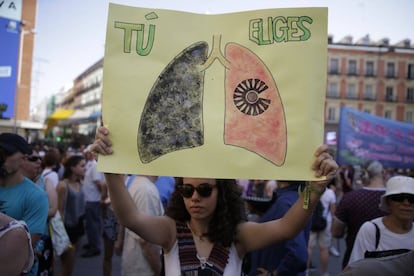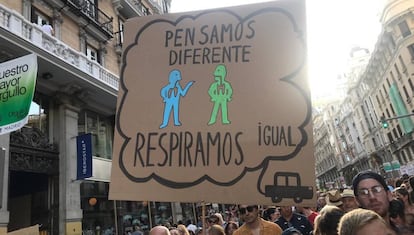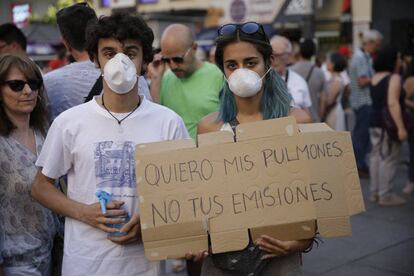Thousands protest in defense of Madrid Central anti-pollution plan
Up to 60,000 people rallied on Saturday in favor of the low-emissions zone introduced by former mayor Manuela Carmena, which has been put on hold by the new right-wing local government


Thousands of people took to the streets of Madrid on Saturday to defend Madrid Central, the low-emissions area aimed at curbing pollution in the capital.
The plan was launched by Madrid’s former mayor Manuela Carmena, of the leftist Más Madrid party, but has been put on hold by the new right-wing Popular Party (PP) government which regained control of the city thanks to support from the center-right Ciudadanos (Citizens) and far-right Vox.


After taking office, the new mayor of the Spanish capital, José Luis Martínez-Almeida, announced a temporary freeze on fines for vehicles that violate the measures aimed at reducing vehicle emissions in the downtown area. While not officially revoking the plan, the freeze effectively cancels it until an unspecified date.
Between July 1 and September 30, vehicles will not be fined for entering the low-emissions zone without permission.
According to the National Police, 10,000 people braved the heatwave to march in defense of the anti-pollution plan, while organizers put the figure as high as 60,000.
“They can’t take away a measure that works just because the party in government has changed,” said Ana Martín, who attended Saturday’s protest with her two children. As a resident of the inner-city neighborhood of Malasaña, Martín has seen first hand how traffic and air pollution have fallen in the center.


Since the introduction of the program, which made 472 hectares of the city center off-limits to traffic, except for local residents and public transportation, emissions in Madrid have fallen significantly. In May, 14 of the 24 monitoring stations in the Spanish capital recorded the lowest levels of nitrogen oxides in a decade. And the only sensor located within the restricted traffic area showed a 48% drop.
“Pollution is one of the most important health problems of today,” said retiree Mariano Sánchez Bayle at the march. “It is responsible for 5,000 premature deaths in Madrid every year. We must take to the street to defend the people.”
The protest statement argued that “environmental pollution and poor air quality are extremely serious problems that should not be linked to the political colors one identifies with,” and pointed out that Madrid could face fines from the European Union commission for exceeding European pollution thresholds.
Impactante pic.twitter.com/IlZirdRboS
— Jesús Generelo (@JesusGenerelo) June 25, 2019
“Striking.”
If Almeida gets rid of Madrid Central, the capital would be the first European city to scrap a measure of this type.
According to Xavier Querol, a pollution expert and researcher at the National Research Institute (CSIC), there are 280 low-emissions zones in the European Union. “All the cities of Europe can’t be wrong,” he said, adding that Madrid Central, which encompasses 4.7 square kilometers is nothing when compared to Brussels’ low-emissions zone which is 88 square kilometers.
Last week, the World Health Organization also warned against getting rid of the anti-pollution plan. “Everything that protects health cannot be touched,” said María Neira, the head of the organization’s public health and environment department.
English version by Melissa Kitson.
Tu suscripción se está usando en otro dispositivo
¿Quieres añadir otro usuario a tu suscripción?
Si continúas leyendo en este dispositivo, no se podrá leer en el otro.
FlechaTu suscripción se está usando en otro dispositivo y solo puedes acceder a EL PAÍS desde un dispositivo a la vez.
Si quieres compartir tu cuenta, cambia tu suscripción a la modalidad Premium, así podrás añadir otro usuario. Cada uno accederá con su propia cuenta de email, lo que os permitirá personalizar vuestra experiencia en EL PAÍS.
¿Tienes una suscripción de empresa? Accede aquí para contratar más cuentas.
En el caso de no saber quién está usando tu cuenta, te recomendamos cambiar tu contraseña aquí.
Si decides continuar compartiendo tu cuenta, este mensaje se mostrará en tu dispositivo y en el de la otra persona que está usando tu cuenta de forma indefinida, afectando a tu experiencia de lectura. Puedes consultar aquí los términos y condiciones de la suscripción digital.








































